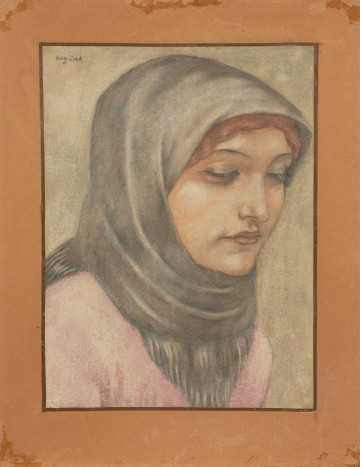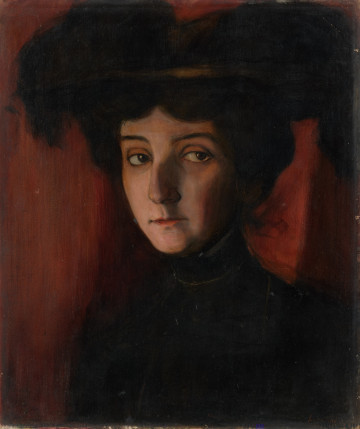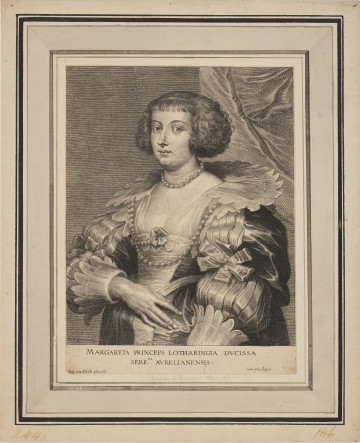
Girl's head (Girl in scarf)
między 1913 — 1920
National Museum in Szczecin
Part of the collection: Stanisław Ignacy Witkiewicz
In 1925, Witkacy devoted himself to the art of portraiture, realised within the framework of the one-man "S.I. Witkiewicz Portrait Company", which was to become a source of quick profit and remedy his financial problems. The artist defined the rules for creating portraits in the technique of pastel, charcoal, crayons and pencil in detailed regulations, specifying with the letters A, B, C, D and E the nature of the five basic types and their combinations. Witkacy's portraits were often created under the influence of psychoactive substances - drugs, intoxicants or alcohol, and the artist described his state using letter and number abbreviations. The portrait of Rosa Duchowa, completed in September 1934, was painted at a difficult time in the artist's life, troubled by financial problems and increasing health problems. Witkacy's publishing failures were prevented by the portrait's husband, Kazimierz Józef Duch, a doctor of laws and an influential politician who held many important posts in the army and the state administration. Thanks to his commitment, the philosophical treatise Pojęcia i twierdzenia implikowane przez pojęcie Istnienia [Concepts and Theorems Implied by the Concept of Existence] was published. As a token of his gratitude, Witkacy dedicated his treatise, Ogólna krytyka materializmu fizykalnego [General Critique of Physical Materialism], to Duch. The image of the busted Rosa was created in the E+D type, assuming "any psychological interpretation according to the company's intuition", without the use of psychoactive means. Usually this type was used for portraits of women whose exceptional beauty impressed the artist. He appreciated the classic features of the model, the charm of her large, expressive, dark eyes looking at the viewer with a certain flirtatiousness, and her well-cut carmine lips. Duchowa was portrayed realistically, with attention to detail. A sketchy, rather conventional blue curtain (?) creates a narrow frame emphasizing the beauty of the woman's face. The image was created without the use of alcohol (NΠ) and cigarettes (NP). The artist drank only a cup of tea, which in the company of a lady from the upper classes was a good tone and helped to overcome tiredness.
Anna Hałata
Author / creator
Dimensions
cały obiekt: height: 48,8 cm, width: 64,6 cm
Object type
drawing
Technique
pastel
Creation time / dating
Creation / finding place
Owner
The National Museum in Lublin
Identification number
Location / status

między 1913 — 1920
National Museum in Szczecin

między 1901 — 1934
National Museum in Szczecin

circa 1632 — 1640
National Museum in Szczecin
DISCOVER this TOPIC
Castle Museum in Łańcut
DISCOVER this PATH
Educational path